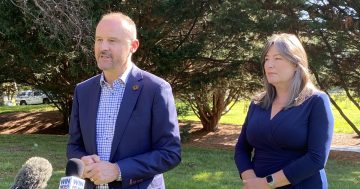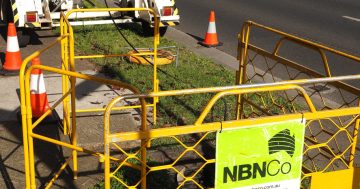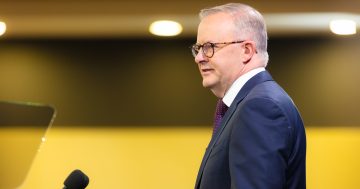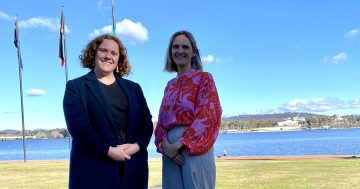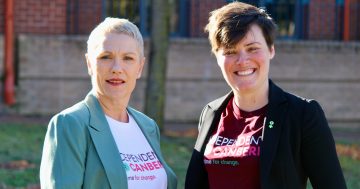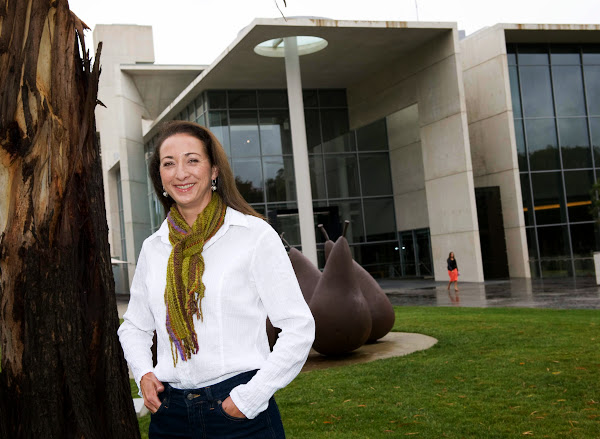
Labor Party’s Gai Brodtmann has provided some big answers to your big questions.
Candidates, the readers of RiotACT are your voters and they have questions for you! If you’d like to answer those questions and prove you care what your voters think then email us at contact@the-riotact.com.
You can find the questions here.
1. What are your views on euthanasia?
I support voluntary euthanasia, but only with the appropriate safeguards and regulations. Currently, the Federal Parliament has jurisdiction over the ability of the ACT to legislate on euthanasia. I would support any move to give the ACT the power to make its own decisions on this matter.
Although euthanasia is currently unlawful in Australia, I know Mary Porter MLA has recently visited countries where governments have legalised euthanasia with numerous safeguards and steps to ensure the process is not misused. I’m looking forward to seeing how the ACT can lead Australia in this policy area in the future.
2. Do you support a High Speed Rail Link between Sydney/Canberra/Melbourne?
Yes, absolutely. High Speed Rail has the potential to transform the way Canberrans live, work and travel, and will bring significant economic, environmental and social benefits tothe ACT and Capital Region.
Labor has just announced it will spend $52 million over the next four years to start the process of land-buying for a Sydney-Canberra-Melbourne line. A Rudd Government would also introduce legislation to protect a corridor for fast trains between Brisbane and Melbourne, and establish an authority to manage the project.
For Canberra, the next step is deciding where a station would be located. I know there are many strong opinions on the location, and I look forward to discussing it with Canberrans.
3. Are you comfortable with the distribution of wealth in modern day Australia?
Everybody would like to see greater equality and income security in Australia.
But this can only be achieved through a strong, growing, open economy, a job, and good education. These are, and always will be, Labor priorities.
I’m living proof of the transformative powers of education. Education allowed me to escape the cycle of disadvantage, and I want every young Australian to have that same opportunity. Because with an education comes a job and choice.
That’s why I’m proud of Labor’s record of keeping the economy strong, with low debt, unemployment and interest rates and a AAA credit rating.
And I’m particularly proud of our investment in the Better Schools Plan, primary school infrastructure, computers in high schools and Trade Training Centres. Trade Training Centres give students choice and opportunity, by allowing them to get a vocational skill at the same time finishing their Year 12.
Labor has also introduced DisabilityCare – an historic reform that will give people with a disability, their families and carers more choice and control that is tailored to individual needs throughout a person’s life. Labor has also given families, pensioners, carers and the most vulnerable, a helping hand when they need it most through our historic pension reforms and record investments in mental health.
By global standards, Australia has low levels of income inequality – in large part because of the reforms of Labor governments, past and present. However the experience of countries that fail to address the gaps between rich and poor is a salient lesson for Australia. That is why Labor, from its inception, has promoted a society that does not benefit just a fortunate few, but gives everyone the opportunity to reach their potential.
4. Recent polling (Auspoll) shows housing affordability to be a critical issue for a majority of Australians, with 84% of respondents saying it was important to them or their families, putting housing affordability ahead of issues such as education, border security, the NBN and NDIS.
The same poll also revealed that 84% of respondents also believe that Australia is not performing well on housing affordability.
Australian Governments are failing badly on this issue of critical importance to Australians.
What would you do to improve housing affordability?
I know housing affordability is an issue of concern for many Canberrans. Since I was elected, I’ve met and helped many women in housing crisis. In fact minutes after I was officially declared the Member for Canberra and opened up the office, the first call I got was from a woman fleeing domestic violence, living in her car with her two teenage children, at the same time undergoing chemotherapy for breast cancer. The women I have met in the last three years are in their late 50s-early 60s, on modest incomes, in the private rental market and with limited super. And they are terrified about their future and a bleak retirement.
Labor has invested billions to make housing more affordable and help people move out of homelessness. We’ve made the largest single investment in housing affordability in Australian history and through it directly contributed to the construction of one in every 20 new homes through programs such as our $6 billion investment in social housing. Our social housing investment has delivered more than 21,600 homes across the nation, 276 in my electorate and the $4.5 billion National Rental Affordability Scheme provides incentive payments to build 50,000 affordable rental homes.
Under Labor, it has also become more affordable for Australians to buy a home. With the recent interest rate cut, the interest rate average Australians will pay will fall further. This means more money in the pockets of Australian families — a family will be saving around $6,000 a year on a $300,000 home loan compared to November 2007. Our economic management has also kept unemployment low, helped to contain inflation and enabled the Reserve Bank to keep interest rates low.
However, there is more work to be done on housing affordability and homelessness. If I am re-elected, it will be an issue of personal focus. I look forward to working with community organisations such as the YWCA, Common Ground, the ACT Government and other Canberrans to work out how we can ensure housing security, particularly for older women.
5. To me the NBN seems like a great idea, can you tell me why you think it’s ace/a dumb idea.
It is a great idea! And the good news is it’s not just an idea. Under Labor, the NBN is a reality.
Fibre-optic cable is the infrastructure of the future. Any government or economy that is serious about future prosperity must invest in this essential infrastructure.
For me, the real pluses of the NBN lie in the opportunities it opens on the education, small business and healthcare fronts.
The NBN gives students and teachers the chance to easily access learning opportunities throughout the world – no matter where they live. The NBN allows small business to work more productively, with better access to new markets and lower costs on business phones, internet and inter-office communication.
And the NBN will change healthcare forever with the provision of aged care and telehealth services online. Ageing Australians will be able to stay in their homes and communities for longer using the NBN to keep in touch with nurses, doctors and family.
6. Do you think cyclists should be registered?!
We’re very lucky to have an ACT Government that has invested heavily in safe off-road paths as well as on-road lanes to make cycling safer for all road users. This investment has increased the number of people riding for transport and recreation and this has longterm benefits for our city. I don’t think the registration of cyclists will have any effect on cycling safety. In fact, I’m concerned it will deter people from cycling when we need to encourage more people to cycle to stay fit and consume less resources.
7. What is your position on gay marriage?
I support marriage equality, and have spoken and voted in favour of it in Parliament last year. I welcome the Prime Minister’s announcement that Labor will bring this policy before the Parliament within 100 days if we are re-elected.
8. Would you be willing to cross the floor on matters of strong personal conscience or of significant concern for your electorate?
No. I made it clear in my first speech that I would “fight for all Canberrans” and would do so “in solidarity with my party, because as long as Labor is strong Australia will be a great nation.”
I have always stood up for my electorate and made my views clear to my colleagues when I think a proposed policy was bad for Canberra. However, I believe the place for these internal party debates is in Caucus, not on the floor of Parliament.
That said, Labor allows MPs and Senators a conscience vote on issues of strong personal conscience – euthanasia, marriage equality, abortion. These are issues I support and Labor’s approach allows me the freedom to follow my conscience.
9. What are your views on the NSA collecting private information of Australian citizens and corporations, of the Australian government’s participation in similar programmes, and of the apparent silence of Australian politicians on the matter?
I have had the privilege of working with several of Australia’s intelligence agencies, and I am confident that the legal framework they operate within is sufficient in protecting the rights of Australians.
The Rudd Government is confident that this legal framework and the rights of our citizens are also respected by our various allies.
I would like to see an increase in the level of public understanding and debate on cyber security issues, including privacy and information security. I recently spoke at the launch of the ASPI International Cyber Policy Centre, which recognises that both state and non-state actors can achieve financial, military, political, ideological or social objectives through cyberspace, to positive or negative ends.
10. We hear so much negativity about the opposition when election time rolls around– what three things do you consider to be positive about any of your opponents and why?
Most of the politicians I’ve served with are deeply committed to improving the lives of their constituents and Australians more generally – we just disagree on the way to go about that.
In my first term, I’ve made friends across all parties, particularly through my committee work. I’ve enjoyed working with Coalition, Green and Independent Members and Senators on gambling reform, improved services and support for wounded soldiers, a stronger diplomatic footprint and reform and infrastructure for our external territories. I strongly believe that political differences shouldn’t interfere with personal relationships.
I’d also like to take this opportunity to acknowledge Senator Gary Humphries. I’ve known Gary for more than 20 years, since the early days of the assembly. In the last three years, I’ve enjoyed working with him on a number of issues important to Canberra. Gary and I worked very closely to shape the Etched In Stone report, which recommends a comprehensive and rigorous approach to improve the way we manage memorials in the ACT. The report was in response to the World War I and II memorials proposal. Although we’ve often disagreed politically, Gary has been a strong advocate for the ACT not just as an ACT Senator, but also as Chief Minister and an MLA before that. I wish him well for the next stage in his career.












